Fernbrook Farms
Fernbrook Farms is a 230-acre (93 ha) working farm located along County Route 545 (Bordentown-Georgetown Road) in Chesterfield Township in Burlington County, New Jersey. Originally an 18th-century farm, it was briefly a stock breeding farm, known as the New Warlaby Stock Farm, in the 19th century. It now includes an inn, plant nursery, environmental education center, and community-supported agriculture.[4] It was added to the National Register of Historic Places on July 7, 2022, for its significance in architecture and landscape architecture.[5]
Fernbrook Historic District | |
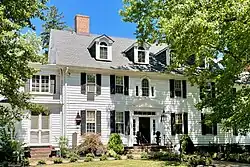 John Newbold House, c. 1761 The Inn at Fernbrook Farms | |
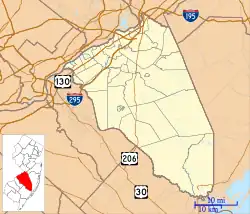 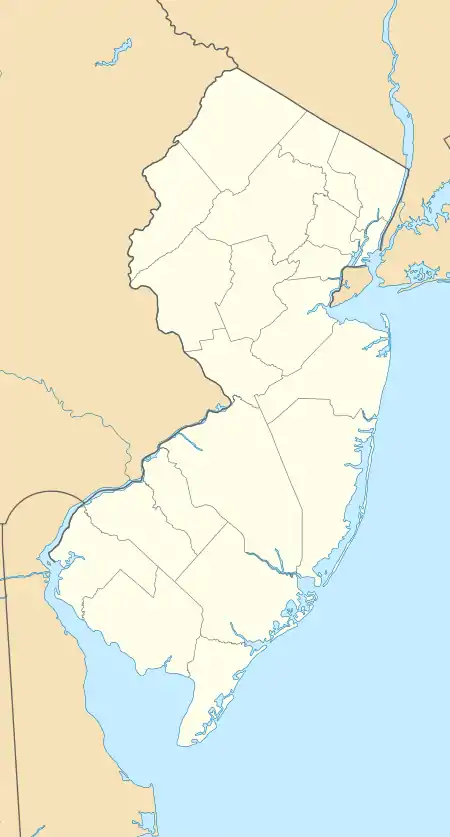  | |
| Location | 142–150 Bordentown-Georgetown Road Chesterfield Township, New Jersey |
|---|---|
| Coordinates | 40°6′14″N 74°40′37″W |
| Area | 111 acres (45 ha) |
| Architectural style | Federal, Shingle, Stick, Colonial Revival |
| NRHP reference No. | 100007873[1][2] |
| NJRHP No. | 5577[3] |
| Significant dates | |
| Added to NRHP | July 7, 2022 |
| Designated NJRHP | May 16, 2022 |
History
In 1760, John Newbold acquired 500 acres (200 ha) of farm land along the Fern Brook from his father Michael Newbold. He then built a two and one-half story frame farmhouse for the estate, c. 1761. The house was expanded in 1791 by adding two bays. In 1881, Charles Morgan purchased 290 acres (120 ha) to raise premium breeding cattle. In 1897, John L. Kuser moved there, and in 1899, he purchased the property. After his death in 1937, his son Walter G. Kuser inherited the property. Lawrence Kuser and his wife Susie started living there in 1974.[5]
Historic district
The Fernbrook Historic District is a 111-acre (45 ha) historic district encompassing the core part of the farm. It was added to the National Register of Historic Places on July 7, 2022, for its significance in architecture and landscape architecture. The district has eleven contributing buildings, six contributing structures, and one contributing site. The Federal-style John Newbold House is the main contributing property in the district. A cedar shaked water tower, built c. 1897, provided water pressure and filtration for Morgan's mansion and the formal Colonial Revival gardens.[5]
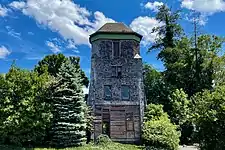 Water tower, the Tankhouse
Water tower, the Tankhouse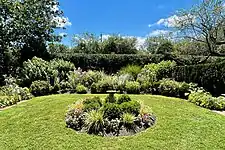 Formal garden with sundial
Formal garden with sundial
Agriculture
In 1881, having inherited money, Morgan imported premium breeding cattle from England, paying nearly US$20,000 for them. They were shorthorns of the Booth stock from Warlaby. He renamed the farm, New Warlaby, and established a model breeding farm.[5][6] However, by 1885, he had sold the cattle to Leslie Combs of Kentucky.[7]
A plant nursery operation was started in the 1970s. A community-supported agriculture (CSA) component was added in 2007.[5]
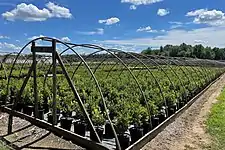 Agricultural fields of the plant nursery
Agricultural fields of the plant nursery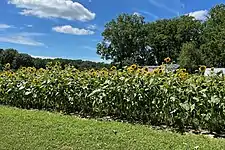 Sunflower field by the CSA farm store
Sunflower field by the CSA farm store
Education
In 2001, Larry and Susie Kuser established an environmental education center on the property.[5][8]
See also
References
- "National Register Information System – (#100007873)". National Register of Historic Places. National Park Service. November 2, 2013.
- "Weekly List 2022 07 08". National Park Service. July 8, 2022.
- "New Jersey and National Registers of Historic Places – Burlington County" (PDF). New Jersey Department of Environmental Protection – Historic Preservation Office. July 15, 2022. p. 5.
listed as Fernbrook Farm Historic District
- "Welcome to Fernbrook Farms". Fernbrook Farms.
- Newman, Margaret; Hintz, Clark Caton (December 2019). National Register of Historic Places Registration: Fernbrook Historic District (Draft) (PDF). National Park Service. With accompanying 67 photos.
- "Costly English Cattle; Imported For Breeding Purposes By Mr. Charles Morgan". The New York Times. June 5, 1881.
Mr. Morgan has recently come into possession of an inheritance, and ... proposes to establish a model breeding farm.
- "About the New Warlaby Booths". The Breeder's Gazette. Chicago: J.H. Sanders & Company. VIII: 260–261. August 20, 1885.
- "Environmental Education Center". Fernbrook Farms.
External links
 Media related to Fernbrook Farms at Wikimedia Commons
Media related to Fernbrook Farms at Wikimedia Commons- Official website
